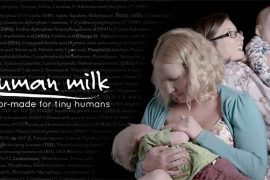By Professor Amy Brown
Being a new parent can be one of the biggest, scariest responsibilities you will ever take on. Growing a whole new tiny person and keeping them alive can be anxiety inducing even for the most laid back. Am I holding them OK? Why are they crying? Am I doing any of this right?
Understanding and alleviating these concerns is a critical part of making sure new parents are supported and feel confident in their new role. Anxiety is not only uncomfortable at the best of times but can lead to relationship conflict, maternal identity issues and postnatal depression.
But as a society we have a major issue in supporting new mothers through this time, because many of us have lost sight of what new babies are really like. We have a habit of interpreting pretty normal baby behavior as something being wrong and needing fixing as it doesn’t fit our societal norms about how we believe babies should behave.
“Good” Babies
Our culture pushes the idea of the mythical “good baby”. Mythical good babies don’t act like most babies. They feed at set spaced out time points, sleep through the night and need little interaction. I say mythical, as research shows that most babies tend to feed often, wake at night throughout their first year and being kept close is a basic human need. But we still persist with asking new parents whether their baby is good, and tutting when we hear about normal baby behavior as if this tiny person needs punishing.
But what’s this got to do specifically with breastfeeding? How does this damage breastfeeding exactly? Because breastfed babies in particular do not act like mythical good babies and trying to encourage them to do so often ends in tears (both the baby’s and yours) and ultimately formula use.
Our culture pushes the idea of the mythical “good baby”. Mythical good babies don’t act like most babies. They feed at set spaced out time points, sleep through the night and need little interaction.
There are some basic differences between breast and formula milk that need to be understood for breastfeeding to work well. Breast milk is more easily digested than formula. Breastfed babies also tend to take smaller feeds as they are more in control of when they start and stop a feed whereas bottle fed babies are more at risk of overfeeding if they are persuaded to do so by a carer wanting to finish the bottle. This means that breastfed babies feed more often, quite easily every two hours or more, including throughout the night, whereas formula fed babies tend to go a little longer. Breastfed babies are also more likely to feed irregularly, as breast milk changes in energy density over the course of the day, whereas formula fed babies are more likely to be fed to a routine as it’s a uniform product.
This frequent feeding is important for breastfeeding and does not mean that something is wrong, as long as your baby is alert, has a good colour and firm skin and is having wet and dirty nappies. Frequent feeding helps to build milk supply and trying to feed less often can lead to milk supply issues and eventually formula use. Feeding responsively, whenever the baby wants, may even promote healthy appetite control later on.











